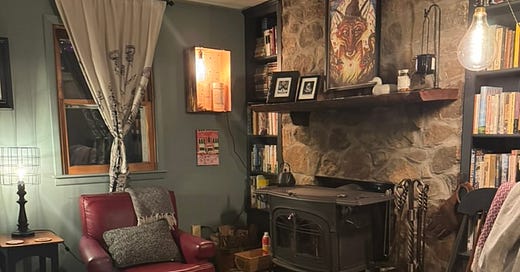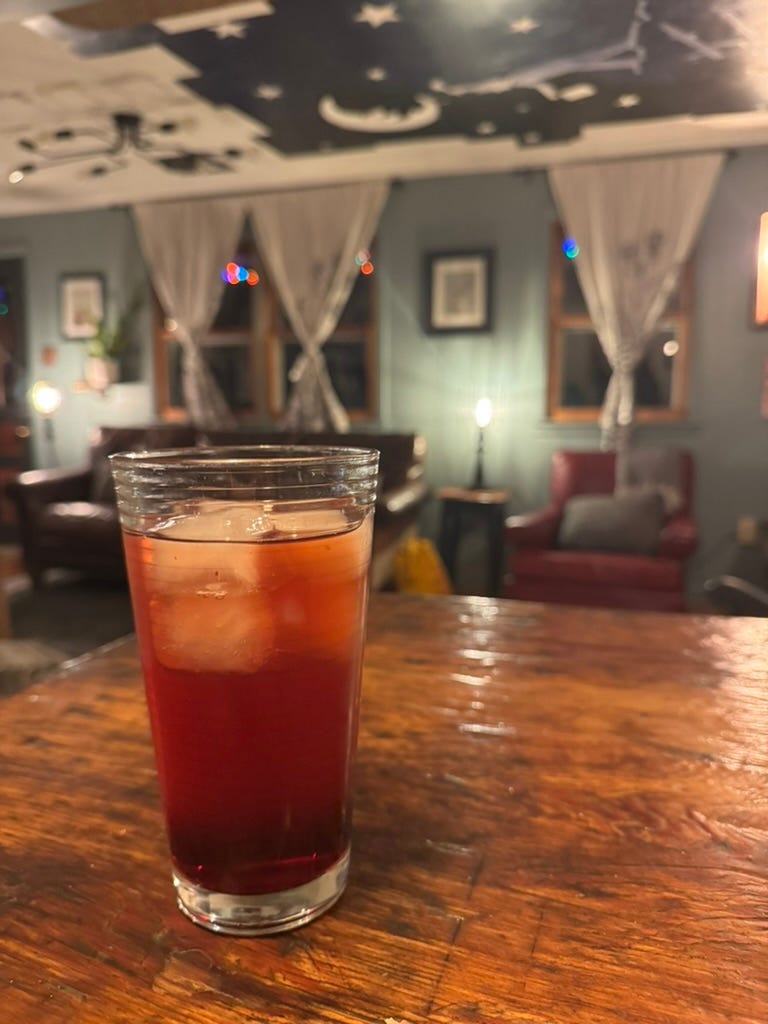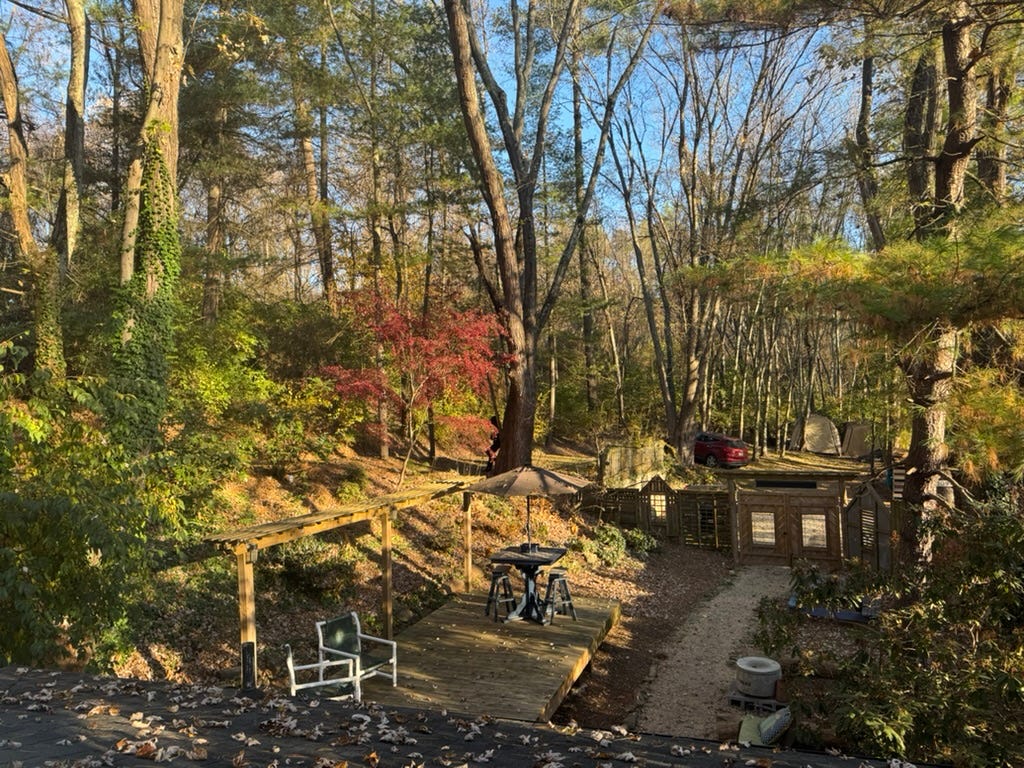The Company You Keep (on Retreats)
What makes a mini writing retreat work, and why I don't go away with just anyone.
In November last year, I took a long weekend away for a DIY writing retreat with my close friend and writing partner. It felt indulgent to go— especially since I’d just returned from Turning Points in October— but it also felt necessary. I was juggling two major projects: my book query and structure, and a personal essay for Narratively that had been accepted while I was in New Mexico.
There was no way to draft that essay at home. It was too challenging to toggle between the emotional headspace the piece demanded and the mental load of mothering. I couldn’t write about almost drinking myself to death and then turn around and help with notecards for my son’s history presentation. I was always split— either half in my writing because I was tuned to the people offscreen, or leaving my desk frayed to trudge through dinner prep, dog walking, and pre-bed anxiety talks with my teenagers.
The structure of the retreat was simple and solid: we woke up around 8, had coffee (for me) and tea (him), ate something light, and talked through the day’s writing. Then we got into it.
We worked for hours, instrumental music humming in the background. Around 12:30, we paused for lunch and talked through where we were with our projects— what needed pushing, what felt stuck, where fear or avoidance was creeping in.
We each cooked one dinner, shared leftovers for lunch the next day, and took turns on dish duty. We brought our own snacks, and meal planned and grocery shopped ahead of time to make sure our food selections aligned. That might sound like a small thing, but I can’t work well if I’m eating poorly. I need real meals— protein, vegetables, whole grains— food that fuels rather than drags.
By four, we’d break for tea, maybe a snack, maybe a walk around the property, and then we’d shift to more relaxed conversation. This writer is one of my closest friends, and we can yap for hours. After focusing on work all day, it was great to dig into the life-stuff: family drama, day job bullshit, a friend who said something stupid that we swore we weren’t thinking too much about.
My friend brought a homemade mocktail concentrate for us to mix with seltzer and have with dinners, and I cannot overstate the affection and appreciation I feel for him for this. Neither of us drank during the retreat— I’m not anti-drinking on retreats as a rule, but it definitely helped with focus and productivity to just….not.
After dinner, we read a bit of what we’d worked on aloud. We ended each night watching something crafty and moody— foreign horror films, mostly— before bed.
We’d rented a small cabin in Maryland, halfway between our homes, with a wood-burning stove and no nearby town. There were no shops, no temptations, and no events to pull us out of our heads. It became a little cocoon, the kind of nurturing and dedicated container I need when I'm working through something emotionally intense.
A disappointing truth I’ve come to terms with is that I cannot write in places I’d also like to explore. If a location is brimming with restaurants I want to try or neighborhoods I want to walk, then that’s what I’ll do. Writing retreats, for me, cannot be vacations. If I’m doing them right, they’re full-time workdays compressed into a short window.
I’ve gone away with writers who were lovely people but terrible retreat partners. In those situations, I do my best. I try to enjoy what I can, and I don’t make plans to write with that group again. It’s not personal— it’s just strategic. I know myself and my work style. I know that lyrical music distracts me, that I need long hours of uninterrupted quiet, that I can’t have people floating in and out of the space I’m working in. Over the years, I’ve come to know which writer friends I can be productive with and which I can’t.
I’ve also learned I need a plan. I cannot simply “show up and write.” I need a clear goal— something specific I’m drafting, editing, or revising. Goals drive my direction, and direction drives my focus. Without that, I flounder.
The November retreat worked because of my alignment with my friend— our goals, energy, and routines matched. We both have book projects underway, and we both needed dedicated time to work through specific challenges in those projects. We often write together over Zoom, so I knew we’d likely be well-matched to go away together.
Being in the same physical space, with time for both work and conversation, was so grounding. He made me thoughtful cups of real tea while I shamefacedly hid my $2.99 box of Trader Joe’s Moroccan Mint. We read each other’s raw pages with consideration and care. The air was brisk, the trees just past peak color, the silence in the cottage full of permission.
Poets & Writers recently ran a piece about writer-led retreats (that I was quoted in!) The article was focused more on organized retreats charging fees to attend, but regardless of their framework, I think there’s still a perception that writing retreats are vacations— or worse, excuses to avoid “real life.” That’s a misunderstanding. Time away to write, either with a seasoned writer at the helm of an established residency or as a small DIY-endeavor amongst peers, is necessary and productive. Yes, being away offers some respite from some responsibilities, but that space is filled with deep, focused labor.
Also, for many of us, the labor we’re spared during this time isn’t eliminated, just front-loaded; before I go away, I prepare child care, pet care, finances, food. It’s a huge lift getting pieces in place so I can leave home to work and not bring my kids along, so when I do have these opportunities, I make a plan. I stack the deck so that the time is worth it. I just cannot afford to squander it.
I’m headed to Tennessee in July, to join this summer’s nonfiction cohort at Sewanee. If all goes well, I’ll be in editing mode and able to make the most of that uninterrupted time. I’m stopping on my way down to visit my friend and writing partner for two nights, though this time just for fun.
I was accepted to two other competitive residencies for 2025, and I turned them both down. There just isn’t enough of me to go around— I don’t have the energy to put the necessary pieces in place to facilitate all that time away.
In my fantasy life (in five years when my kids are both in college) I hope I’m able to attend some of these residencies I’m not able to now. I dream of spending four months at MacDowell— that kind of focused time would likely see me emerging with a drafted manuscript.
Right now, though, that’s not my life, and so I have to squeeze the most I can from the quiet I can get. When I went away last fall, I gave myself the space to write something I couldn’t have touched with my kids nearby. I needed the emotional privacy, the safety of a trusted friend, and the ability to fall apart on the page without having to pull it together by dinnertime.
There is a supply and demand problem in every writer’s life: the need for solitude and space will always outpace the time we actually get. For me, it’s vital to be intentional about how I use my time.
Mini writing retreats work for me when the purpose is clear, the partnership is right, and the structure supports the work. When all that’s in place, it’s magic— not the kind of magic that does the writing for you, but the kind that clears the path so you can.








